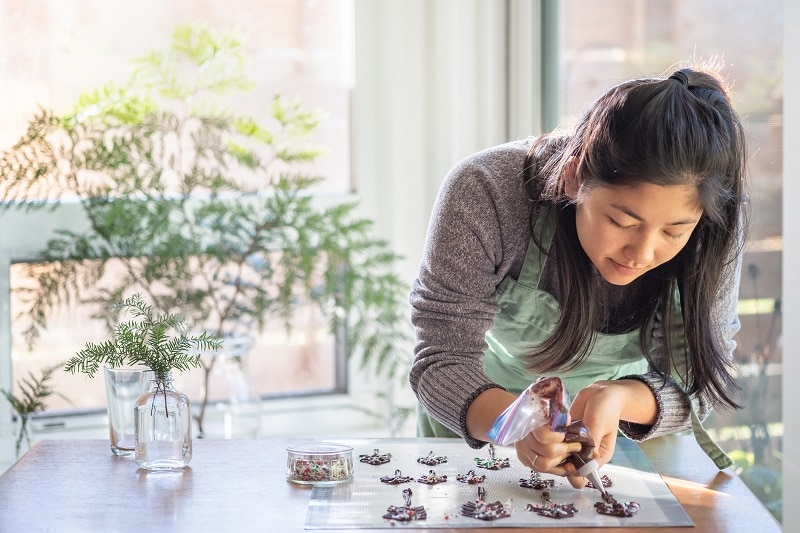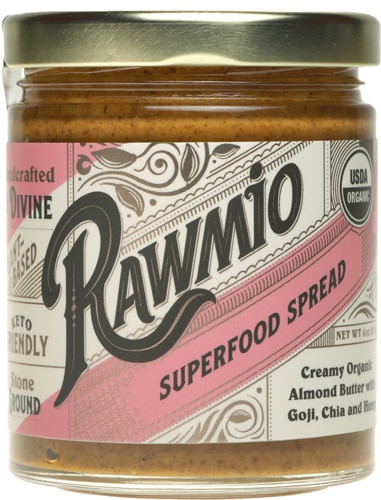Feeling overwhelmed by the task of
baking holiday goodies for your celebrations? If you've recently transitioned to a vegan or plant-based lifestyle and are accustomed to traditional baking with eggs and dairy, the challenge is real. Take a deep breath and never fear. The guide to getting you started with plant-based baking is here!

Vegan Baking: Substitutions, Tools & More
Most regular baking recipes include animal products like eggs and milk. While it's possible to replace them, knowing what to use takes a little know-how, trial and error. Starting with a
vegan or plant-based recipe takes the guesswork out – ingredient replacements are already curated for you.
Use a trusted database of
recipes or grab a fun
vegan cookbook for dependable animal-free recipes. Do a test run of the recipes before the big day to iron out any issues and avoid unwanted surprises.
Plant-based baking substitutions
Flax seeds are a standard vegan egg replacer. Once ground, they transform into “flax eggs.” The oil in
flax seeds break down quickly, so for the best results, get
whole flax seeds and grind them just before use. Leftover flax keeps for a year in the freezer.
Chia seeds swell up to 12 times their weight making them the perfect thickener and binder for replacing eggs in baking recipes. Use them whole or grind them when making desserts with smoother consistencies.
Chia seeds also make scrumptious
chia seed puddings and
fruity jams.
One tablespoon of flax or chia seeds plus three tablespoons of water can replace one egg in a baking recipe. Whisk together and let it sit at least five minutes to thicken before using.
Mashed
ripe bananas can replace egg, butter and sugar. They add banana flavor to the mix, so use when banana complements the overall taste of your dessert.
Applesauce and
pumpkin puree replace oil in a recipe because they add needed moisture. They can also replace eggs and add natural sweetness, reducing the need to use tons of sugar.
Maple syrup is a natural, tasty plant-based sweetener that replaces honey in recipes and adds a maple flavor.
Coconut palm sugar and
coconut nectar are other alternatives in powder forms like sugar and a liquid similar to honey.
Stevia is an all-natural sugar alternative with zero calories and carbs that is also low on the glycemic index. If you or others in your family can’t use traditional sweeteners, this is a great alternative.
Beans have a surprising use in plant-based baking. Aside from adding protein and fiber to recipes, they make decadent
flourless desserts.
Cacao and
cocoa powders are pantry staples. Cacao powder is unroasted and less processed than cocoa powder. Cacao powder is usually vegan, but some cocoa powders contain animal ingredients. Check the label before making your purchase.
Dairy-free dark chocolate is a vegan pantry must-have to enjoy delicious chocolate treats. Buy it in
baking blocks or chips, melt it into sauces and fold it into cakes and other desserts. Look for fair-trade chocolate with quality ingredients.
Canned coconut milk is a rich and delicious replacement for cow’s milk. Place the can in the fridge or freezer to separate the liquid from the cream, and use the coconut cream as you would heavy cream.
Must-have tools
Having the right tools makes all the difference with raw vegan and plant-based baking.
High-speed blenders and
food processors are perfect for grinding, blending and pureeing.
When it comes to raw baking, recipes are often left to set or chill, so keep space in your refrigerator and freezer for such occasions.
Overpacking flour creates overly heavy baked goods. Invest in a
flour sifter to aerate flours, and be sure not to overpack your
measuring cups.
Grinders are the perfect way to create small amounts of crushed ingredients, like seeds and spices.
Raw baking essentials
A raw food diet includes unprocessed forms of wholesome, real food ingredients not heated above 114 degrees F. Raw baking is less about "baking" and more about incorporating tasty, fresh, visually appealing elements to create flavor-filled desserts.
Dates add healthy sweetness, fiber, binding power and texture to raw desserts. You can find
date-based sauces, syrups and sugar as alternative sweeteners.
Apricots and
figs also work similarly but aren't quite as sweet. Try them all.
Cashews are soaked and blended to add creaminess. Ground
almonds,
walnuts and
sunflower seeds make nut butters, flours and crusts.
Avocados add silkiness to raw recipes. They also are an incredible oil replacement in vegan baking in general. Try using it instead of oil in your recipe, with one avocado replacing one-half cup of oil.
Coconut oil is liquid at room temperature and hardens as it cools, making it ideal for adding texture and stability to tarts, pies, cheesecakes and more. Add this item to your pantry for raw and vegan baking.
Shredded coconut adds flavor and texture to crusts and other elements.
Silken tofu can replace eggs and create the creaminess desired in many purees, cheesecakes, pie fillings and puddings. The flavor is neutral, so it won't overpower other ingredients.
Start your vegan, raw or plant-based baking with trusted recipes, then use these useful tips to make your own recipes or recreate old favorites.




